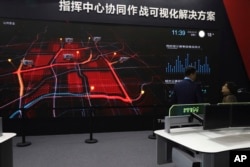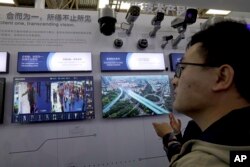Thirty years after China’s deadly Tiananmen Square crackdown, Beijing is exporting authoritarianism and prodding governments around the world to spy on and control their citizens, U.S. lawmakers and human rights advocates said on Wednesday.
“Sadly, China’s authoritarian model is appealing in all too many places around the globe, where dictators and despots are happy to accept China’s assistance in repressing their own people,” said the top Democrat on the Senate Foreign Relations Committee, Bob Menendez of New Jersey.
Witnesses testifying before the panel noted China’s massive investments in technology to track its people physically, in telecommunications and in cyberspace - a capability the country is promoting to governments from Asia to Africa to Latin America.
“China is exporting these technologies to other autocratic regimes around the world, normalizing and enabling global authoritarianism,” Xiao Qiang, founder of the U.S.-based China Digital Times, said.
China touts its high-tech surveillance systems as key tools in fighting crime and responding to emergencies. But the systems can also be used for the social control measures that Beijing uses to monitor political speech and crack down on dissidents.
Analysts say that's exactly how some countries are already using their new equipment.
"In 2014, we documented [Chinese corporation] ZTE’s sale of telecom surveillance technology to the Ethiopian government, which used that equipment to monitor its political opponents," said Human Rights Watch’s China director Sophie Richardson.
“As the leadership in Beijing has become more repressive domestically, China has grown more ambitious internationally in ways that are anathema to democratic values and the rule of law,” National Endowment for Democracy Vice President Christopher Walker said.
As the country has become a manufacturing powerhouse and high-tech exporter, Walker says Beijing is eager to spread the surveillance technologies they are perfecting at home.
"The wrinkle today that should concern all of us is that China is sharing these technologies in open societies," Walker said. "This is really critical to the understanding of China’s evolution and its ambitions."
The Trump administration has sanctioned ZTE for technology exports to Iran and North Korea, and banned another Chinese telecommunications giant, Huawei, from America’s nascent 5G infrastructure.
Lawmakers said they are eager for further action to rein in Beijing.
“China is exploiting the openness of advanced democracies to chill freedom of expression. This is rule by fear,” the committee’s chairman, Republican Sen. James Risch of Idaho, said. “The United States should make the defense of intrinsic values, like fundamental freedoms and human rights, a more central part of our approach to China.”
To that end, the witnesses had suggestions.
“Being consistent on human rights is essential [for the United States]. If you’re selective about it, then you are leaving yourself vulnerable to criticism that you only care about these issues in one place for political reasons rather than for principled ones,” Richardson said. “It undermines the idea that human rights are universal.”
Walker urged “democratic solidarity at a very basic level” and “new models of cooperation” with the participation of technology and data experts as well as legal authorities attuned to privacy issues.
Walker said, “All the democracies are in this together, and to the extent you have democracies in sub-Saharan Africa or Latin America which are now adopting the technologies from China, but also the norms that come around them …this is going to take a lot of work.”


